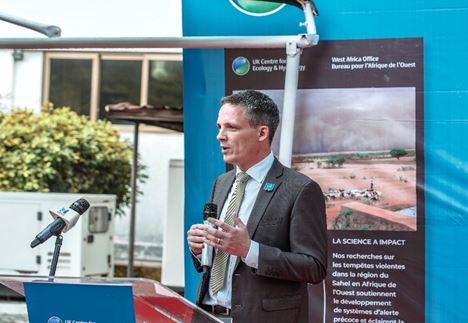By Deborah Asantewaah SARFO
The UK Centre for Ecology and Hydrology (UKCEH) has expanded its global presence by establishing a West African office in Accra, in response to pressing environmental issues affecting the continent.
This strategic move aims to leverage science, technology and innovation to help countries on the continent progress and improve their sustainable development.
According Chief Executive-UKCEH, Dr. Stuart Wainwright, the motive for setting up the first office outside the UK is aimed at helping government, businesses and non-profit organisations grasp the environmental challenges facing the world and “how to deal with those challenges to boost wealth, produce enough food and keep the environment clean”.
He stated that the development of national and international capacities and enhancing research with a larger regional impact remain the centre’s two primary objectives.
Concerning the sector’s contributions in responding to agricultural and climate-related issues, Dr. Wainwright elaborated how the centre will utilise its expertise in hydrology and metal pollution to address floods and help agencies identity solutions to the issues.
“We have got real expertise in hydrology, in how to understand what’s going to happen with floods and droughts – and that’s already helping people in this part of the world get better at their meteorological and flood forecasts, and to plan better for the future. Also, our work in metal pollution will help citizens to understand its impact on their health and the environment. This will help agencies here deal with that problem and ultimately make the environment cleaner, helping people’s health as well,” he explained.
Additionally, on the issue of addressing floods in the country, Head-West Africa Office, Adelaide Asantewaa Asante, mentioned that they are already in talks with the Centre in the UK to look at how it can replicate a National Assessment of Flood Risk in the country with funding.
In addition to flooding issues, she noted that biodiversity and greenhouse emissions among others are challenges identified in the country.
Ms. Asante has highlighted the significance of the Centre’s presence in the region, noting that it will bring the UKCEH closer to its partners and enable a deeper understanding of the local ecosystem and its challenges to work together on finding common solutions to them.
In response to the British High Commission’s role in supporting the Centre’s activities, Deputy High Commissioner Keith McMahon said they will introduce them to potential contacts and partners in the country who can help roll out science, tech and innovation.
He urged the local scientific community to collaborate with experts at the centre to explore more opportunities.










